Finding their way
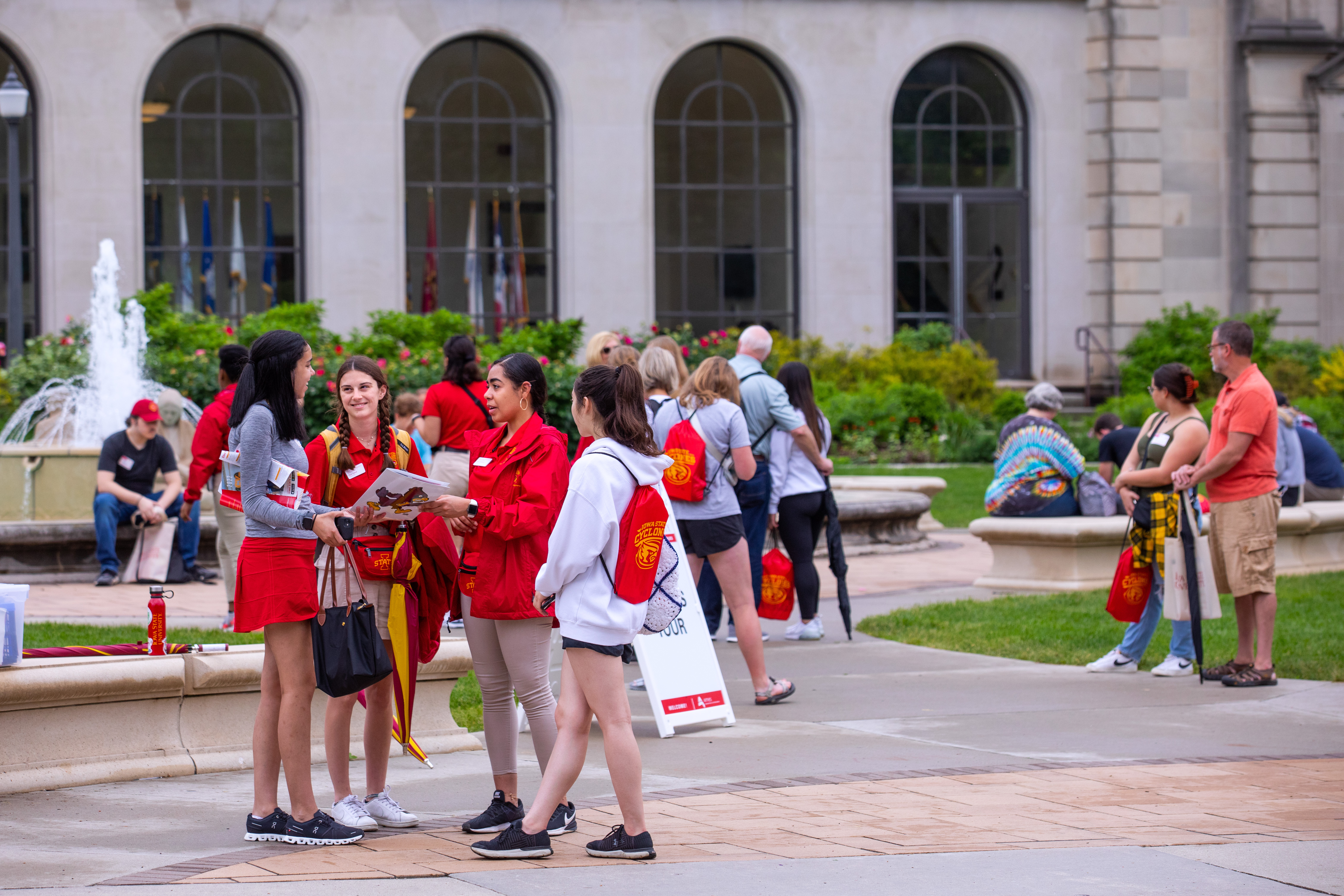
Photos by Christopher Gannon.
Nametag-wearing Cyclone Aides Piper Carroll, left, and Kiara Quijano assist in directions to incoming students as others gather for an orientation campus tour outside of the Memorial Union on June 6. More than 5,000 first-year students are planning to participate in on-campus orientation in sessions throughout June this summer, the first time full in-person orientation has been offered since 2019. Orientation organizers urge faculty and staff to be especially friendly and helpful when encountering visiting students and their families.
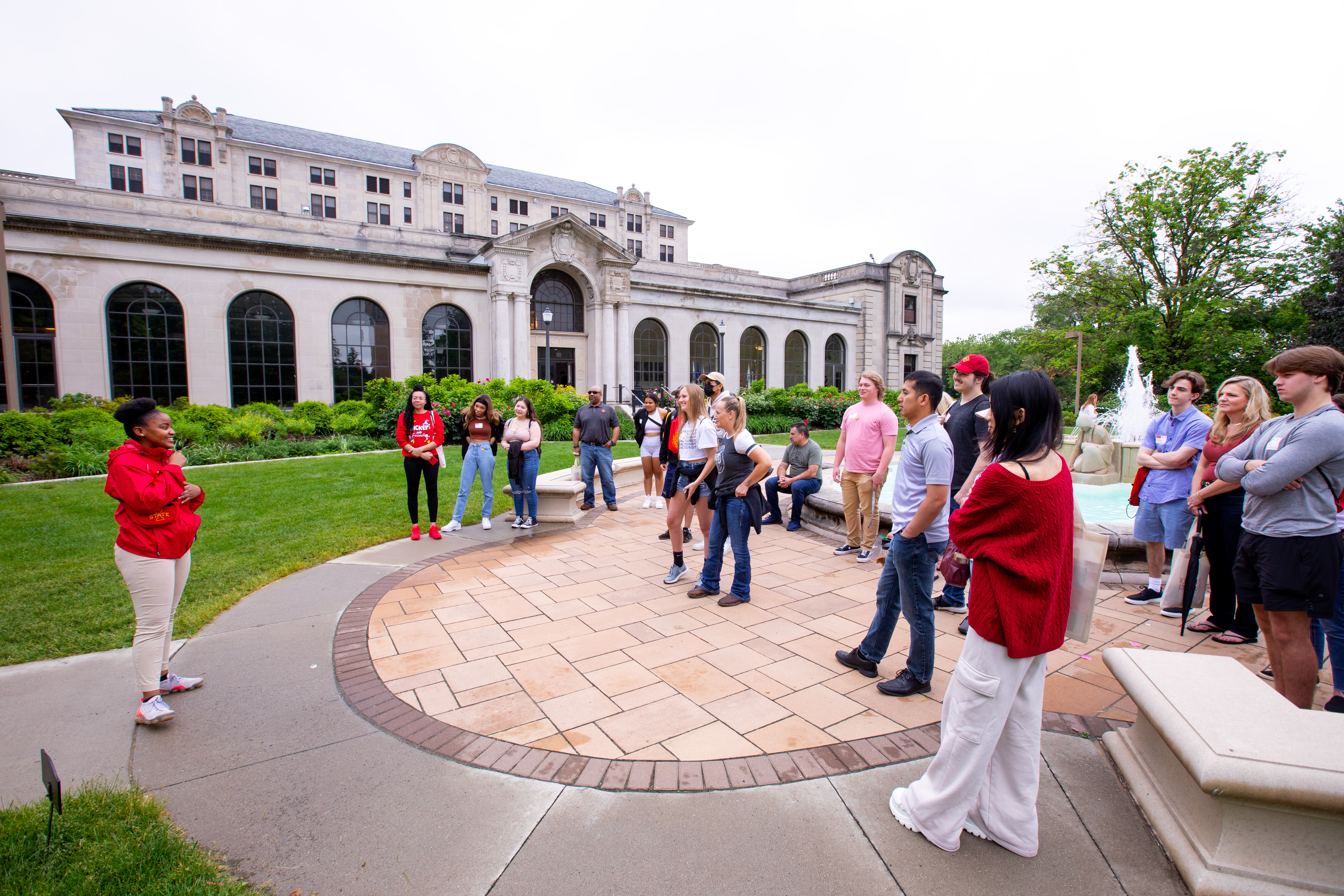
Cyclone Aide Naledi Kekana, left, welcomes a group of incoming freshmen with their families at the outset of an orientation campus tour outside the Memorial Union.
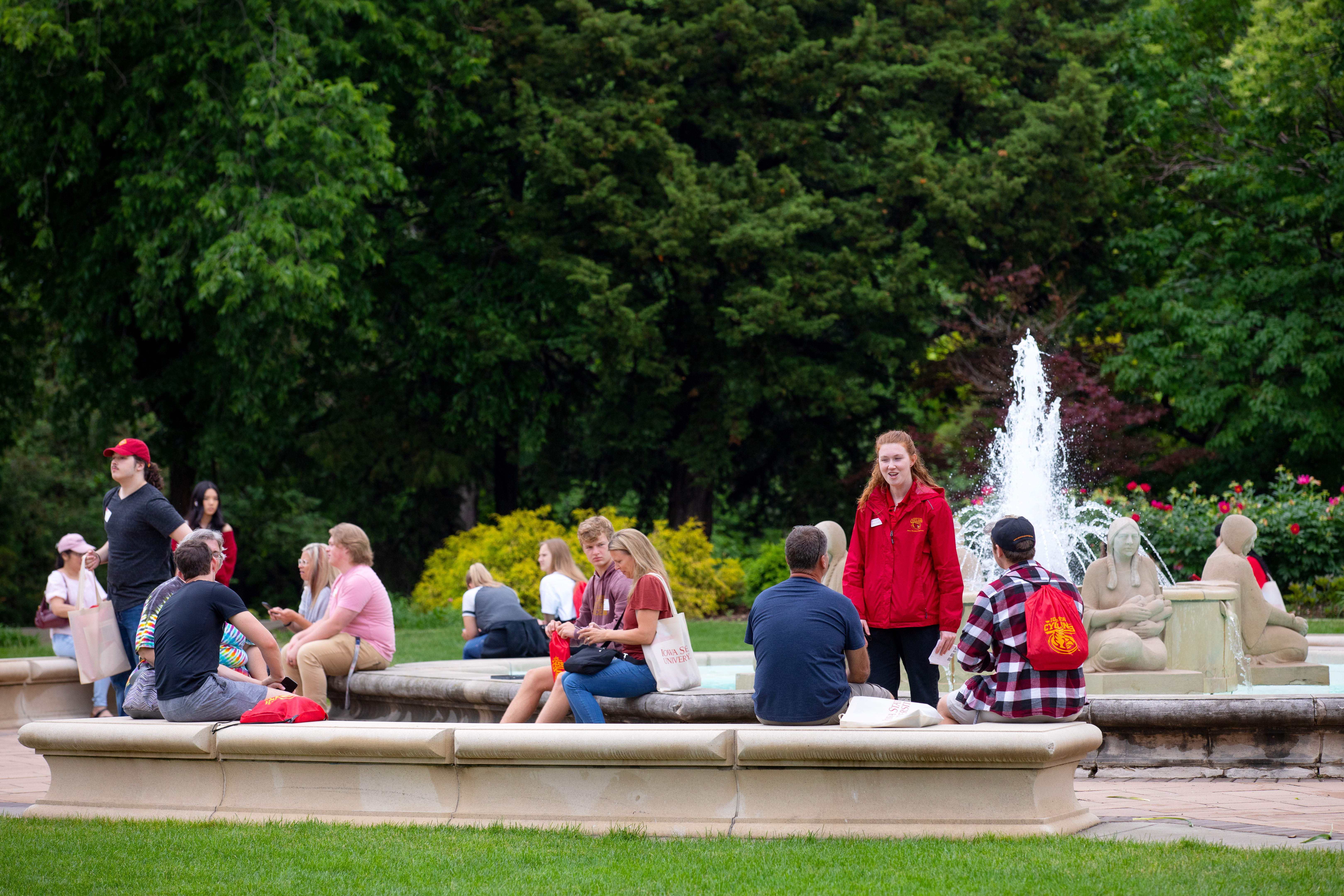
Incoming freshmen and their families gather around the Fountain of the Four Seasons and talk to Cyclone Aides before a campus tour.
3.1% salary increase approved
The state Board of Regents' executive director has approved Iowa State's parameters for FY23 performance-based salary increases, effective July 1, and additional discretionary performance-based increases, effective Oct. 1. The parameters for faculty, professional and scientific staff, contract employees and post docs are:
- A salary increase of 3.1% will take effect July 1 for all eligible employees whose performance meets expectations.
- Supervisors may provide additional discretionary increases between 1% and 4% for outstanding performance. Discretionary increases will take effect Oct. 1 and be calculated from the Sept. 30 salary. More information about the procedures for the Oct. 1 discretionary process will be provided to campus leaders in July.
Given the timing of the state appropriations and tuition decisions, this provides a simplified approach to meet the deadline for July 1 increases while giving units additional planning time for performance-based discretionary increases. A decision on tuition rates for the upcoming academic year is expected at the regents' July 27 meeting.
These parameters may be adjusted for Iowa State employees of the Ames Laboratory to coincide with applicable federal salary adjustment guidelines.
Merit staff will receive a 1.1% pay increase on July 1, consistent with the state's collective bargaining agreement with the American Federation of State, County and Municipal Employees, Iowa council, and an additional 2% for satisfactory performance on their annual review date (excluding the public safety bargaining unit).
"Performance-based pay increases are important to support our commitment to our excellent faculty and staff," said President Wendy Wintersteen. "While the university continues to face financial challenges, we recognize our employees are facing similar challenges in this economy. The job market has become increasingly competitive, making pay raises even more critical as a tool to maintain top talent."
New timeline eyed
The university intends to move future performance-based salary increases for non-Merit employees to later in the fiscal year to align with state appropriations and tuition decisions and provide sufficient time for budget planning. More information about this transition will be shared in the coming months.
Nine priority projects will jump-start next strategic plan
Meeting June 2 in Iowa City, the state Board of Regents approved Iowa State's 2022-31 strategic plan, a nine-year guide to an annual process that will identify priorities and direct funding to projects and initiatives that address them.
With the first planning process set to get underway this fall, President Wendy Wintersteen announced the university is jump-starting the strategic plan now with a $10.5 million investment in nine projects that address one or more of the plan's five aspirational statements. She said the funding will come from private gift funds available to her for discretionary one-time use. Following the board meeting, she outlined the projects in a memo the campus community.
The projects have a one- to three-year timeframe and include strategies to boost enrollment, add high-demand degree programs, hire faculty in critical areas, build research teams and modernize research facilities. One invests $600,000 -- plus an additional $442,000 in university funds -- at two campus childcare facilities to address a critical worklife issue for employees with young children.
"While there are many worthy initiatives we could have chosen to jump-start our plan, these were identified through campus feedback and input during the plan development process as high-priority areas that can have an immediate impact," Wintersteen said.
Wintersteen has appointed members of her leadership team to oversee the nine initiatives and work with campus partners in the coming months on implementation plans.
Jump-start projects
Wintersteen summarized these nine projects in the jump-start effort:
- $3.5 million to support faculty hires in key areas that track with Iowa State's research strengths and emerging degree programs.
- $1.5 million to start academic degrees that meet student and employer demand -- also known as the "Degrees of the Future" initiative.
- $1.5 million to launch a university-wide initiative to increase student retention and graduation rates, with a focus on first-generation and multicultural students and students whose academic progress was most impacted by the pandemic. This project emerged from Learner Success Lab recommendations.
- $1 million to more effectively recruit freshman and transfer students to build overall enrollment. The strategies come from faculty and staff members' "100 Ideas," for example, new certificates from collaborations with Iowa employers and community colleges.
- $1 million for unique, major research instrument purchases and lab infrastructure improvements.
- $600,000 to develop Iowa State Online, a university-wide brand and support structure that will bring online education programs under a single umbrella.
- $600,000 (plus $442,000 in university funds) to renovate two campus childcare facilities, at College of Veterinary Medicine and on North Stange Road, to improve learning, safety and comfort for the children of faculty, staff and students.
- $500,000 to build and provide seed funding for new interdisciplinary faculty research teams in areas where Iowa State has a competitive advantage, for example, water management, carbon sequestration, advanced materials and cyber.
- $300,000 for open educational resources and immediate-access materials in undergraduate high-enrollment courses to ease textbook cost for students.
Each project supports between one and three of the aspirational goals in the 2022-31 strategic plan, as summarized below.
Support for the five aspirational goals
|
Strategic goal |
Number of jump-start |
Total jump-start investment |
|
To be the most student-centric leading research university. |
6 |
$3.8 million |
|
To be the university that cultivates a diverse, equitable and inclusive environment where students, faculty and staff flourish. |
2 |
$1.3 million |
|
To be the university that fosters lifelong learning. |
3 |
$1.5 million |
|
To be the university that creates opportunities and forges new frontiers. |
2 |
$1.9 million |
|
To be the trusted partner for proactive and innovative solutions. |
4 |
$2.0 million |
|
Total |
|
$10.5 million |
Project leadership
Wintersteen said she'll hire a strategic initiatives director to oversee the strategic plan process, an annual opportunity for faculty and staff to apply for funding for projects that help achieve the plan's goals.
"Each year, as well as at three-year and six-year checkpoints, we'll be able to assess where we stand, infuse new ideas and respond to our dynamic landscape," she said.
Related story
There's still time to share comments on the strategic plan draft, Feb. 24, 2022
Extension's Lawrence announces spring retirement
John Lawrence, vice president of ISU Extension and Outreach, interim chair of the animal science department and professor of economics, has announced his intent to retire in spring 2023.
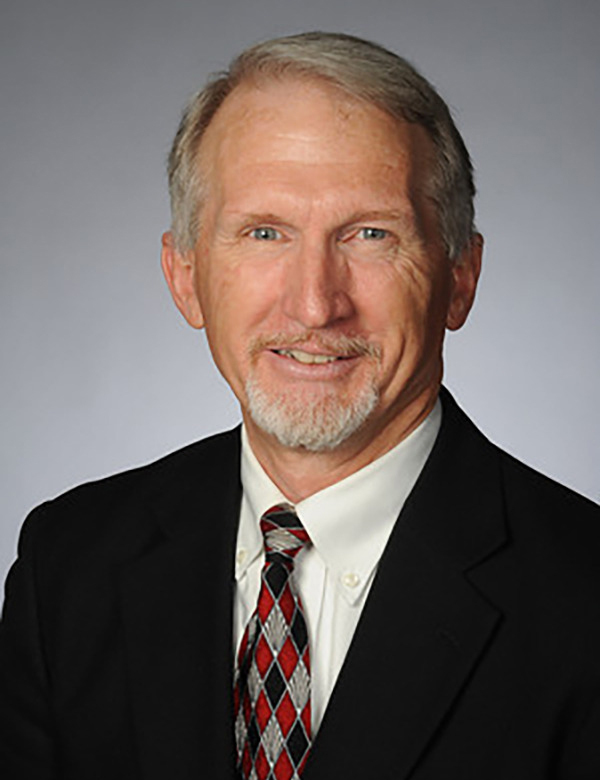
John Lawrence
"It has been a profound privilege to serve Iowa State University and the people of Iowa," Lawrence said. "From visiting every county office -- many on my motorcycle -- to working with students and colleagues in every corner of campus, and literally working in the field, it is a journey I have very much enjoyed."
A two-time alumnus, Lawrence joined Iowa State in 1991 as an assistant professor of economics and extension livestock economist. Prior to his selection as vice president of extension and outreach in 2018, he served as associate dean and director of extension and outreach in the College of Agriculture and Life Sciences, director of the Iowa Beef Center and provided interim leadership for the Beginning Farmer Center, Center for Agricultural Law and Taxation and Iowa Nutrient Research Center.
Lawrence also served the university with distinction during the COVID-19 pandemic, chairing the Fall Planning Executive Committee in 2020 and 2021's Moving Forward Coordinating Committee.
"John Lawrence is Iowa State's version of a Swiss army knife," said senior vice president and provost Jonathan Wickert. "A true university citizen, he has stepped up countless times when units needed steady leadership, and in doing so, created an enduring legacy on our 99-county campus."
Wickert said Iowa State will launch a national search for Lawrence's successor in the coming weeks. The search committee, to be chaired by college deans Laura Jolly (Human Sciences) and Dan Robison (Agriculture and Life Sciences), will include faculty and staff from across the extension and outreach enterprise and external stakeholders who value its work across Iowa's 99 counties.
In addition to his many on-campus roles, Lawrence represented Iowa State on numerous high-profile initiatives. Recent examples include the Governor's Carbon Task Force, Farm to Table Task Force and Iowa State Fair board.
Graves reappointed as Graduate College dean
Graduate College dean Bill Graves has been reappointed to a second five-year term, effective July 1.
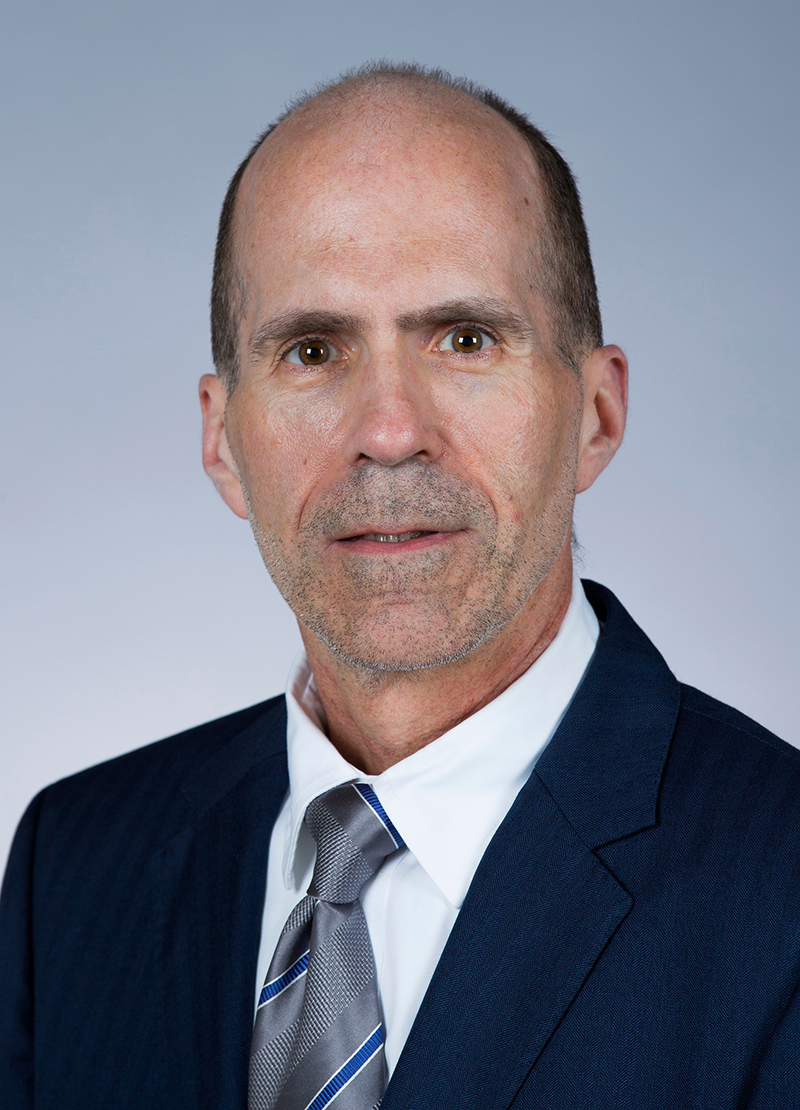
Bill Graves
Graves, a professor of horticulture, originally was appointed to the position in 2017 after serving as associate dean for seven years. He also served as director of graduate education in the horticulture department for 12 years and director of interdisciplinary graduate studies for seven years.
Senior vice president and provost Jonathan Wickert, in making the reappointment, noted Graves' achievements in enhancing diversity, equity and inclusion within the college, as well as expanding graduate student career services, enhancing the college's Center for Communication Excellence and enrollment management initiatives, and maintaining support for students and postdoctoral scholars through the pandemic.
"I am pleased Dean Graves will continue to lead Iowa State's graduate education programs and support the recruitment, retention and success of the university's graduate students," Wickert said.
In his second term, Graves will focus on graduate college operations, interdisciplinary programs and graduate student recruitment and success.
"Leading the Graduate College has been a great honor," Graves said. "I look forward to working with the graduate faculty, college staff, postdocs and students to sustain our momentum over the next five years."
Cleaning out an office? Don't forget university archives
Summer is the busy season for the library's special collections and university archives (SCUA) department. Submissions pick up as retirees pack up their offices and campus workspaces are renovated or cleaned.
So it's a good time for some tips for faculty and staff to consider as they're going through old files or otherwise wondering what and how to contribute to Iowa State's archival repository.
Posterity is the purpose
It's helpful to remember SCUA's future-focused purpose. The aim is to collect, preserve and provide access to records (and other items) that document experiences, achievements and memories that reflect the university's major research areas and its history. The archival value of records depends on how useful they might be to future researchers, historians, instructors and others interested in Iowa State's past, said Greg Bailey, university archivist.
Materials collected are typically inactive, meaning they're no longer used day-to-day and were likely created at least five years ago. The preference is for final versions over drafts, originals over copies and summaries over individual records. For more examples and details, see SCUA's donation and transfer guidelines. Don't hesitate to contact a SCUA archivist for help in identifying what might be worth archiving, Bailey said.
"You don't always need to be the judge of what's historical," he said.
Perusing personal papers
From their personal files, faculty and staff should consider records connected to their most significant research, teaching, extension, service and administrative work. That could include correspondence, research notebooks or data, committee minutes, annual reports, syllabi, diaries or scrapbooks. Labeled photos and videos are valuable in part because they show areas of campus that aren't well-documented, Bailey said.
"When people want to see what the interior of a building looked like, we often don't have that," he said.
For personal papers, archivists prefer a coherent body of records over individual items. Confidential records aren't collected, such as those covered by legal protections for educational, medical and personnel information. Published articles don't need to be archived because they generally are accessible through journal databases.
Retirement often prompts faculty and staff to review their records, but starting early in the process is key, Bailey said. There is a backlog for processing submissions.
"Hopefully, we make a connection before your last day in your office," he said.
Institutional history
Some units regularly send certain records to SCUA, such as commencement programs from the registrar's office and annual reports on ISU farms from extension and outreach. And websites on iastate.edu are automatically archived for SCUA via a third-party service.
But SCUA largely relies on departmental employees to select and transfer university records to archives. Of interest, Bailey said, are newsletters, reports, committee files, administrative records, departmental histories, flyers, architectural plans, photos, and recordings of speeches and lectures. Items that aren't accepted include transaction and financial records (other than annual budget reports), routine correspondence, personnel files, conference records and mailing lists.
"We aren't the dumping grounds for records people don't want to get rid of," Bailey said.
Some departments are in the habit of regularly submitting documents for archiving, but SCUA sometimes contacts centers or departments that have little or no documentation in the archives, he said. SCUA also has proactively worked with students and student organizations to preserve information about their notable activities, including campus activism and recollections of COVID-19's impact.
Preparing a submission
When faculty and staff donate personal records to SCUA, a deed form needs to accompany the gift. University-owned records already are Iowa State's property and don't require a deed to be transferred. In both cases, fill out a donation/transfer form before submitting documents to let archivists know what you are interested in providing.
When possible, donated files should be kept in their original order and stored in folders and boxes labeled with dates and subjects. Label physical photographs by writing on the back with pencil, including a date. Digital records should use consistent file names. Include the name and address of the sender and an inventory. An inventory template is available online.
More than just papers
SCUA doesn't solely collect documents. Guidelines for contributing to SCUA's rare book and manuscript collection are online in the collection development policy. It maintains several collections of oral histories, which can be a useful way to document the history of a department.
SCUA also holds about 3,500 artifacts, though Bailey said the bar for acceptance is high for artifact donations. Several types of items no longer are accepted, including copies of The Bomb yearbook, postcards, trophies and plaques.
To be accepted for collection, an artifact must have unique characteristics, hold high research value or potentially be useful for future exhibition, outreach or instruction. Items that meet more than one of these requirements are more likely to be accepted. Due to space constraints, larger items need to be even more significant to make the cut. Contemporary objects rarely warrant saving, Bailey said.
"We're really only looking for historical physical objects of an unusual nature," he said.
Learner Success Lab puts focus on data to drive retention, completion
A campuswide effort has produced a roadmap for improving student success over the next decade. Recommendations from the initiative informed Iowa State's new strategic plan, which was approved by the state Board of Regents at its June 2 meeting.
Iowa State was one of 10 institutions selected to participate in the American Council on Education's Learner Success Laboratory, an 18-month initiative supported by a grant from the Strada Education Network, to develop institutional strategies for student success.
More than 70 ISU faculty, staff and students worked on the project, led by project co-chairs Shawn Boyne, director of academic quality and undergraduate education in the office of the senior vice president and provost, and Robert Reason, associate dean for undergraduate education in the College of Human Sciences, and a 14-member steering committee.
Learner success includes not only how well students do in their academic coursework, but also critical factors such as retention, degree completion, preparation for lifelong learning and workforce readiness.
Ann Marie VanDerZanden, associate provost for academic programs, said the challenges associated with learner success have been exacerbated by the COVID-19 pandemic.
"The pandemic has been a challenge for everyone, but the impacts are especially pronounced among students who finished high school online and may not be as prepared for the increase in academic rigor as well as the transition to life on campus," she said.
In its report to the university, the ACE site visit team highlighted Iowa State's land-grant mission as a student-centric leading research university, its passionate and engaged faculty and staff, and its strong first-year retention and six-year graduation rates. The university's first-year retention rate was 88% last year, compared to the national average of 76% for four-year public institutions. Iowa State's six-year graduation rate is 76%, nearly 20 points above the national average of 57%.
Recommendations from ISU's project summary report include:
- Take steps to reduce the equity gaps for retention and degree completion among underrepresented students.
- Prepare to meet the needs of "new majority" learners such as first generation, low-income and transfer students.
- Make data more broadly available to inform decision-making, focus efforts and provide a mechanism for accountability.
- Create a "culture of completion" that supports students from their first day on campus to their graduation.
"The legacy of the Learner Success Lab project is a framework that will help us continually improve how we work together, across units and divisions, to serve students' needs," VanDerZanden said. "It's fulfilling our promise to do everything we can to help students not only reach the finish line of completing their degrees, but prepare them for lifelong professional success."
Specific action items to be developed over the summer will include:
- Universitywide goals for student retention, success in gateway courses such as calculus and participation in high-impact practices.
- Broadening access to tutoring services.
- Focusing academic advisors on at-risk students.
- Initiatives that foster students' sense of belonging on campus.
Several of these are part of the "jump-start" to the new strategic plan, announced June 2 by President Wendy Wintersteen.
Wheeler to help coordinate efforts as faculty fellow
Andrea Wheeler, associate professor of architecture and 2021-22 Faculty Senate president, has been named to a three-year, half-time appointment as Provost's Faculty Fellow for Student Success, effective July 1.
Wheeler will work with VanDerZanden to coordinate and lead a student success task force focused on using data to inform decision making, expand partnerships across the university, identify initiatives to support targeted student populations, and collaboratively develop benchmarks and metrics to meet graduation and retention goals.
"I am excited to serve Iowa State in this broader capacity and to bring a faculty voice to our student success initiatives," Wheeler said. "I look forward to expanding my network across campus and also better understanding students' needs outside the classroom, which also play a critical role in their academic performance."
Wheeler, a first-generation student, joined the Iowa State faculty in 2013. She earned a bachelor's degree at Plymouth University, a master's degree in mechanical engineering and diploma in architecture from Oxford Brookes University, and a Ph.D. from the University of Nottingham, all in the United Kingdom. A scholar in the sustainable architecture of educational buildings, Wheeler recently completed a research fellowship in the Centre for Research in Advanced Social Sciences and Humanities at the University of Cambridge.
Welcome
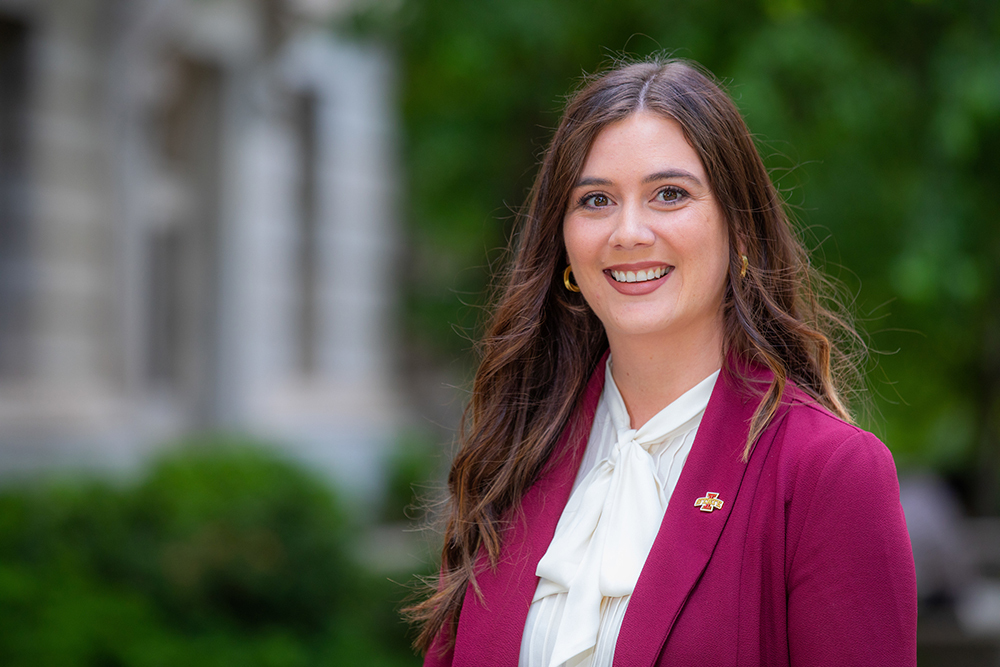
Haley Moon is the assistant director of federal relations. Photo by Christopher Gannon.
Haley Moon began serving in a new position, assistant director of federal relations, on May 31. She joins director Sophia Magill in what is now a two-person team. She'll work with Magill to:
- Further develop university relationships with the federal government's legislative and executive branches.
- Advance the university's federal priorities and strengthen its contributions to national panels and policy boards.
- Share federal policy and research initiatives with the university community.
For the last five years, Moon has served as advocacy and political action manager for the Iowa Association of Electric Cooperatives, Des Moines, where she developed and implemented strategies at the state and federal levels. Previously, she served in the Washington, D.C., office of former Iowa congressman David Young (2015-17) and the Des Moines office of Sen. Joni Ernst (2015). She also worked in the Iowa House of Representatives during her college years.
Moon earned bachelor's degrees in political science and history (2015) from Iowa State.
She will be based on campus, in the office of the president, 1750 Beardshear. She can be reached by email at hmoon@iastate.edu, by phone at 515-294-4770.
Nearly 400 requests approved in WorkFlex's second round
Hundreds of new WorkFlex requests were approved during the second application window for the flexible work program, according to data university human resources (UHR) staff shared with the Professional and Scientific Council at its June 2 meeting.
The 383 approved requests are for flexible work arrangements that were effective beginning May 16, the first day of summer classes. About 600 staff took advantage of the program during its first application window, for plans that began at the start of the spring semester in January.
WorkFlex allows eligible staff flexibility in when, where and how they work -- if it fits with their job duties and the university's mission. The available alternatives include a hybrid schedule of working remotely up to three days a week, by far the most-used option in both the first round of requests (84%) and the second round (88%).
Staff can request WorkFlex arrangements during three application periods throughout the year, before the fall, spring and summer terms. Plans can be approved for the upcoming semester, the next two terms or a full year. More than 60% of the requests during the first window were for plans that extended multiple terms, through the summer or fall. In the second round, that ratio flipped, as two-thirds of the requests were for summer only.
Because of the varying arrangement lengths and a change in how requests are processed in Workday, UHR is still working on reporting to pinpoint the total number of staff using WorkFlex, said Ed Holland, director of benefits and WorkLife. The new submission process will make data more readily available after future rounds of WorkFlex requests, he said.
From UHR's perspective, the program has been running smoothly, Holland said. A survey conducted in April by the council found WorkFlex is popular with P&S staff, with 90% of 785 respondents saying they support it and 71% saying they are satisfied with the options provided.
An analysis of the survey's open-ended questions likely will be presented at the council's July meeting, said Jacob Larsen, peer advocacy committee chair. Greater transparency and more consistent implementation are among the themes identified in those responses, he said.
Through July 1, eligible staff can apply for a flexible work plan in the third round of WorkFlex, for arrangements effective beginning Aug. 22. For more information, see the program website. A knowledge base article in the ISU Service Portal describes how to request an arrangement.
Changing of the guard
New council members and officers officially begin their duties at the start of the fiscal year July 1 but are seated at the June meeting. In 2022-23, the council's president will be Jamie Sass, director of the writing and speaking center in the Ivy College of Business. President-elect will be Patrick Wall, an ISU Extension and Outreach beef specialist based in Knoxville. The council will have 23 new members elected or appointed this spring.
Regents approve strategic facilities plan, industrial engineering building
Iowa State's 30-year strategic facilities plan provides a framework for renewing and investing in existing buildings whenever possible and replacing them with modern spaces when it's not. It looks at both cost and sustainability considerations in making those decisions. Over the life of the plan, it would refresh 48% of outdated campus space and eliminate half of the university's deferred maintenance log -- currently at about $500 million.
The state Board of Regents approved the plan June 2 during its meeting in Iowa City.
In several enrollment scenarios, a campus space inventory indicates a need for academic and research space, an excess of office space, and adequate student and support spaces. One of the plan goals is to right-size those space assignments.
The plan focuses on four areas for renewal, each of which outlines buildings for renovation and demolition as well as sites for new construction:
- Osborn Drive (STEM disciplines)
- Four colleges: Engineering, Design, Agriculture and Life Sciences, Veterinary Medicine (including the VM research institute)
- New interdisciplinary hubs for instruction (for example, a communications complex)
- Student affairs, including a student services center and larger health/wellness center
Therkildsen building
The regents approved a budget ($54 million) and project description for the proposed Therkildsen Industrial Engineering Building for the industrial and manufacturing systems engineering department, the final green light required from the regents. The building will be located northwest of Beyer Hall and include teaching and research labs, classrooms, offices and a food cafe. Preliminary work begins later this summer to replace parking spots in Lot 3 this project will eliminate. Connecticut-based SLAM Collaborate is the design-build firm hired in 2019. The cost of the project will be covered by a $42 million gift from alumni C.G. "Turk" and Joyce McEwen Therkildsen and university funds.
Board-mandated free speech training
Representatives from the three universities provided spring semester completion data among students and employees for an online training module, and summarized campus efforts to promote it. In February 2021, the board agreed to provide and require annual training on the First Amendment and free speech for the regent university campus communities. It launched during spring semester.
In response to an inquiry, board counsel Aimee Claeys said she doesn't anticipate the training module will be tweaked for fall semester.
"We'll review it over the summer," she added. "Training isn't static, and we want it to be accurate. As it needs to evolve, we'll be adaptable."
Completion rates at end of spring semester: Free speech training
|
University |
Faculty and staff |
Students |
|
Iowa State |
81%* |
37% |
|
Iowa |
57%** |
35% |
|
Northern Iowa |
76% |
39% |
*Staff 86%, faculty 68%
**Non-health care employees 62%, health care employees 55%
Wintersteen evaluation
Following its semi-annual performance evaluation of President Wendy Wintersteen, the board approved a $50,000 increase to her base salary, effective July 1, raising her annual salary to $650,000. The board also approved additional deferred compensation for two years (fiscal years 2023-24) of $40,000 annually. This is on top of previously awarded deferred compensation of $200,000 per year covering November 2020-June 2023, and $100,000 per year covering July 2021-June 2023.
"We're very pleased with our university leadership," said board president Michael Richards in announcing the compensation changes for the three campus leaders. "We want to continue with the same leadership team, and this is an indication of our willingness and interest in keeping a steady course as we go forward."
Other Iowa State business
In other business, the regents:
- Elected the incumbent board leaders, president Michael Richards and president pro tem Sherry Bates, for two-year terms, through April 2024.
- Directed the universities to, when they're complete, submit FY23 salary policies to executive director Mark Braun for final approval.
- Approved Iowa State's new B.S. program in healthcare management in the department of management and entrepreneurship, starting this fall.
- Approved a three-year pilot (July 1, 2022-June 30, 2025) to reimburse benefit-eligible employees for some or all qualified expenses in the adoption of a child. Regent institutions that elect to participate in the program would work with Braun to develop specific procedures. Details about Iowa State's participation will be shared later this month in Inside.
- Reappointed Bonnie Whalen as university secretary and Pam Cain as university treasurer for the fiscal year beginning July 1.
- Gave Iowa State permission to begin planning for an estimated $25 million parking lot improvement project at the Iowa State Center that would raise the lots above the 100-year flood plain and add water, power, gas, phone, storm and sanitary lines, to support future development, under about 80% of the lot area south of Center Drive. Six north lots -- A1, A2, B3, B4, C3 and C4 -- are designated for a future phase. As proposed, a combination of university and athletics department funds would be used for this project.
Celebrating and commemorating Juneteenth
Iowa State is involved in events in Ames and Des Moines to celebrate and commemorate Juneteenth. Juneteenth refers to June 19, 1865, the day the last enslaved people in Texas learned they were free -- more than two and a half years after the Emancipation Proclamation had abolished slavery in the Confederate states.
An ISU link to Juneteenth
How Senior VP Toyia Younger's cousin Opal helped make Juneteenth a national holiday
Last year, President Joe Biden signed into law Juneteenth as an annual federal holiday. Iowa has marked this day of recognition since 2002, designating the third Saturday in June as Juneteenth National Freedom Day.
Ames celebration
A Saturday, June 18, Juneteenth celebration at Ames' Bandshell Park (Duff Avenue and 6th Street) is open to the public. The schedule includes family activities and food vendors (3-7 p.m.), a line dance party (6-8 p.m.) and a Black superhero movie screening at 8 p.m. The celebration is sponsored by several community partners, including the City of Ames, Ames chapter of the NAACP, ISU's Black Faculty and Staff Association and Iowa State University. More information is available on the Ames NAACP chapter's website.
Des Moines-area celebration
Learn more
From this message of inclusion by Sharon Perry Fantini, vice president for diversity, equity and inclusion, you can explore the university library Juneteenth guide and share your knowledge with others.
The Des Moines Urban Experience is coordinating numerous events and activities in Des Moines and surrounding suburbs June 2-20, including music and theater performances, book drive, "Virtually Free" documentary screening and the 32nd annual Neighbor's Day festival on Saturday, June 18 (11 a.m.-11 p.m., Western Gateway Park). Senior vice president for student affairs Toyia Younger will co-host the Juneteenth Gospel Celebration on Sunday, June 12 (6 p.m., doors open at 4 p.m., Franklin Junior High, 4801 Franklin Ave,). The full schedule of events for the metro observance is online.
